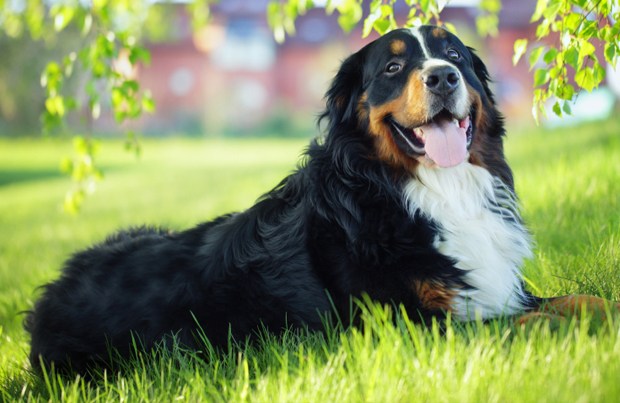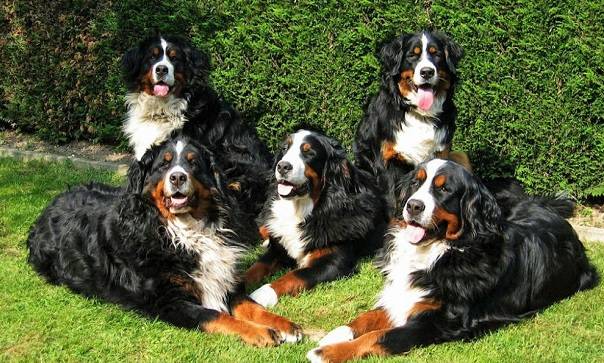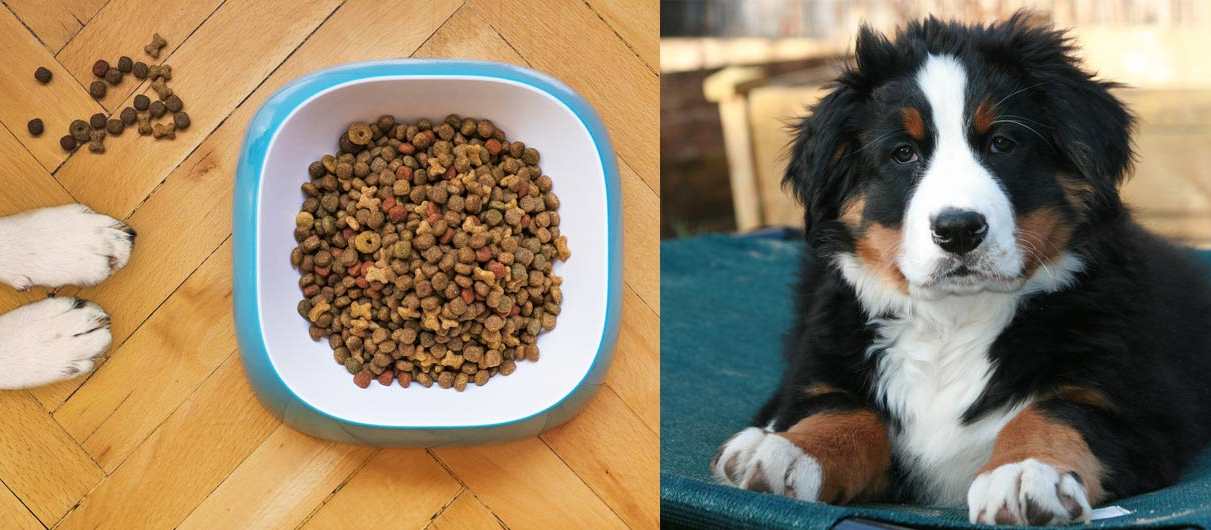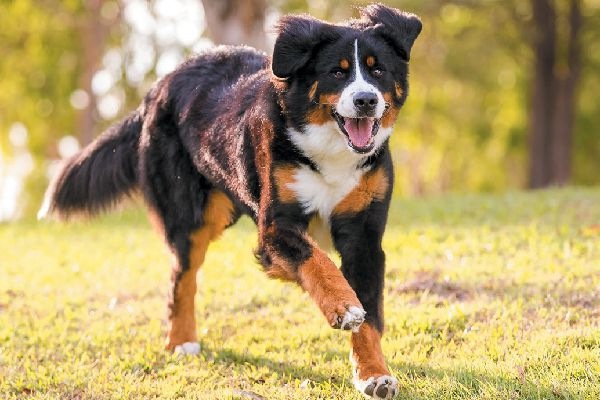The Bernese Mountain Dog descends from a family of giant-breed dogs. They are recognized for their long, silky fur, exceptional ability to herd cows, and even watch livestock against predators.
More or less, Bernese Mountain Dogs are among the best canines we can ever have. Let’s look into some exciting facts about this beautiful breed:
| Common Name | Bernese Mountain Dogs |
| Other names | Berner, Berner Sennenhund, Durrbachler |
| Height | 23 – 28 inches |
| Weight | 70 – 120 lbs |
| Life Span | Average of 8 years |
| Country of Origin | Switzerland |
Appearance
Bernese Mountain Dogs are strong working canines with stunning tri-colored coats. The typical patterns are black, white, rust, and sometimes black, white, and brown. They possess a relatively long, thick coat that needs regular brushing to maintain its silkiness and prevent any tangles. The rustic coat covers their eyebrows, cheeks, and legs. The white pattern on their face makes them cute.
This dog looks a little bit longer than its height – standing at 23-28 inches and weighs between 70 and 120 lbs. Considering its bulk, Bernese can knock down an adult male during playtime. He has a firm build. Moreover, he is also long and well-balanced, giving him a strong, stable, and muscular appearance.
The dog also has a big, flat skull, with a slight furrow and clear stop. Its nose is straight with a solid and medium-length muzzle. Other features include slightly rounded triangular-shaped ears. At the same time, the eyes are brown and almond in shape. It has a long tail and wags when it’s active and dangles during rest.

History
The Bernese mountain dog, Dürrbachhund, came from the small town of Dürrbach in Switzerland. This dog was initially used in farming, such as pulling carts, herding cattle, and observing the farmyard.
By the late 19th century, though, as things started to change, only a part of the population continued to work in the agriculture field. Because of this transition, the demand for this dog suddenly lowered.
Then, this breed was brought back when they were presented at a dog show in Berlin during the early 20th century. After this event, Dürrbachhund was changed to Berner Sennenhund, following the Swiss Berne.
In 1926, Bernese Mountain Dog was brought by locals from Louisiana and Kansas to the United States. Eventually, the American Kennel Associated recognized this breed in 1937. Then in 1968, an organization was formed by some dog owners and breeders, The Bernese Mountain Dog Club of America.

Temperament
Bernese Mountain Dogs are exceptionally gentle breeds and will be the perfect family companions. Parents won’t be troubled having this dog bond and play with their kids. This breed is good-natured and will show its goofy character on occasions to entertain its hooman. Though Bernese sometimes displays its adamant and assertive side, it’s rarely highly energetic or unruly.
Since they are initially working dogs, they’re eager to learn new skills. Due to their bulkiness, obedience training is a must for these dogs to make them lovely additions to the family. But, they are known to mature slowly (mentally and physically) and must not be forced into immediate training. They are gentle giants and do not do great with ruthless discipline.
Having an innate ability to watch their surroundings, Bernese dogs will make an excellent watchdog. They tend to bark if they sense something is wrong; however, they will not attack and bite unfamiliar faces. They are more likely to become distant and withdrawn when surrounded by strangers. Therefore, early socialization is necessary for this breed.
These dogs like to live in packs; they may exhibit unfavorable habits like digging, chewing, and excessive barking if left alone for a very long time. To prevent this, give him something to keep them entertained if you’ll be away for a while.
Diet and Foods
All giant dogs need specific foods that stimulate steady growth to prevent any bone problems. Feed them with real, fresh foods. Dog food sold in the market sometimes has fillers or unhealthy ingredients.
As a dog owner, you need to consider their age, weight, exercise, and metabolism when determining the amount of food necessary for your pet.
On average, the Bernese Mountain Dog eats between 3-5 cups of high-quality, dry food daily, divided into two servings. High-quality dry foods guarantee a healthy diet for mature Bernese. You may also feed your dog small portions of cooked eggs, cheese, vegetables, and fruits as a means of adding enzymes to their intake.
Puppies will tend to overeat, so it’s essential to correct their menu at a young age to ensure slow growth and prevent weight gain.
Also, remember not to feed your Bernese puppy with wet dog foods as they spoil quickly and lead to indigestion, diarrhea, and other problems.

Life Cycle
These dogs are slow to mature. It does not fully attain its full-grown height and weight until the age of 2-3. His size may not match his intellectual age, and his motor skills can improve. Usually, between the Bernese dog’s first year to 18 months, he’ll appear bony, lanky or unstable, and clumsy.
There are also times when he looks a little discouraged. Don’t sweat it since development will happen eventually. As mature dogs, they like to move around more often. Pregnancy lasts for 61 days with females, with a potential litter size of up to 14 puppies.
Lifespan
On average, Bernese Mountain Dog has a life expectancy of eight years. If proper and healthy living conditions are provided, they can still live longer.
Pet Care
Bernese Mountains Dogs require special care and living conditions to be healthy and lead a good life, considering their enormous size.
Living Conditions
These dogs are good indoor breeds and like to live with the family with plenty of human interaction and care. They must not be kept enclosed in a kennel or tied outside your home.
Your Bernese mountain dog must have a cozy, quiet place to sleep with enough ventilation. An elevated bed or a wooden bed with a mattress is ideal for them. You can also place a clean blanket as a cushion. Don’t forget to wash the blanket or sheet biweekly.
Living in a condo is not advised because of his size and active lifestyle. They need enough space, such as a backyard, to walk around. If they escape from your property, be at ease as they will return after a bit of a walk in the neighborhood. You may install a fence, about four to five feet, within your property to prevent this from happening.
The cold never bothers them because of their double-layered coat; hence they can’t tolerate the scorching weather. If you live in the countryside with a warmer climate, you need to bring your dog outside at night or any time of the day where it’s the coolest.
If your dog likes to spend more time outside your home, provide them a cool place to decompress and access to cool water during the hot season and a warm, dry area when it is cold.
Training
Bernese Mountain Dogs are clever dogs. They know how to please their owners, listen to every command, thus making the training session somewhat easy. Because of their working background, they understand the things that need to be accomplished.
As they become stubborn as they age, Berners must be trained when they are still a puppy. A puppy can pick up the basic commands with his owner or trainer at home.
You must exercise positive reinforcement throughout the training because these dogs are pretty “sensitive.” They can quickly feel down and become terrified if you punish them. You must be patient, calm, and trust them throughout the training session. Your dog will be diligent if you keep the course as fun and as energetic as possible; be specific about your commands and directions.
Exercise Requirements
Congrats on having a very energetic and lively dog. And to keep them in good shape, experts recommend 60-90 minutes of exercise daily.
Keeping them engaged intellectually is equally essential as having them physically active. Your Berners will inform you if they lack some workouts by chewing or whining.
You’ll find that Berners will enjoy exercises that involve human interaction. These dogs love to meddle in the daily chores of their family. If you leave them on your property, your dog will not get the right amount of physical activity that he needs.
Allow him to rest, and during sweltering weather, be more restrained and take extra precautions.

Health
Bernese Mountain dogs are prone to several hereditary diseases and other medical problems, and you must be aware of those health conditions as their owner. The following medical issues are the most prevalent based on information from the Canine Health Information Center:
- Cancer
- Elbow dysplasia
- Hip dysplasia
- Gastric Torsion/Bloat
- Progressive retinal atrophy
- Subaortic stenosis
- Von Willebrand’s Disease
You have to bring your Bernese Mountain Dog to the vet frequently to keep him in great shape. Early detection of complications will allow you and your vet to outline a treatment plan before any conditions worsen.
Schedule your Berners for vaccination regularly. Pay attention to any sudden change in behavior, symptoms of swelling, or any physical changes in your dog.
Maintenance/Grooming
Since Bernese Mountain Dogs have a long, thick coat, brushing their hair a couple of times a week is a must. This will lessen the amount of shedding, keeping their hair tangle-free. Brushing will likewise encourage circulation and skin improvement.
Regular baths aren’t required except when they get very muddy — overbathing can worsen shedding and lead to dryness. Every couple of months with the proper shampoos is enough. Remember to brush their teeth 2-3 times per week to prevent the accumulation of bacteria and tartar. There’s a specific toothpaste for dogs, so don’t use your toothpaste on your dog.
Additionally, inspect the ears weekly for any symptoms of ear problems, such as foul odor or redness. Never use a Q-tip to clean their ears; instead, soak a clean cloth or cotton ball with an ear cleaner and lightly rub it in your dog’s ears.
Don’t forget their nails! Nails that are too long can cause a dog’s feet to spread out and cause pain. Inspect them weekly and cut them using a clipper and file using an emery board.
Handling
Bernese Mountain puppies are easier to handle. When picking this puppy up, please put your hands underneath your Berner’s chest, and support his bottom and back legs using your forearm or another hand. Never raise or carry them by their neck, tail, or forelimb.
When carrying a more mature dog, raise them from the bottom, supporting his bum using one of your arms and chest with the other.
Availability
The best way to find a reliable Bernese Mountain Dog breeder is to communicate with the national club for Bernese Mountain Dogs. The organization has a complete list of trustworthy breeders and accredited Dog Rescue groups.
Cost
A Bernese Mountain puppy is not that pricey compared to other breeds. Though, this dog will still cost you a lot, around $1,200 on average. Their price can go from $800 to $10,000 or more.
Interesting Facts
- Bernese Mountain dogs are often characterized as versatile.
- They are so-called the King Of Cold Weather.
- Expect to have a durable vacuum cleaner if you plan to buy one of this breed.
- They are most popular in Germany.
- The Bernese Mountain Dog is incredibly robust and can pull a cart ten-fold its weight.
- Berners have a dry mouth.
FAQs
Is a Bernese Mountain Dog an excellent family companion?
They generally make excellent family watchdogs, and with proper socialization, be good with unfamiliar faces and other animals.
Are Bernese Mountain Dogs Hypoallergenic?
No, this is not a hypoallergenic type of dog.
Do Bernese Mountain Dogs Shed?
Yes! Bernese Mountain Dogs do shed an awful lot. Frequent brushing can help eliminate excess fur; however, expect to see clumps of hair on the floor, sofa, and garments.
Are Bernese Mountain dogs aggressive?
No. This dog is among the least aggressive breed. Berners are gentle and very friendly towards humans and other pets.
Do Bernese Mountain dogs choose a favorite hooman?
The Bernese Mountain Dogs will usually pick their hooman, and then they will do anything to get the person’s attention.
Are Bernese Mountain dogs intelligent?
Yes! They are easy to train and can follow commands if taught at an early stage.